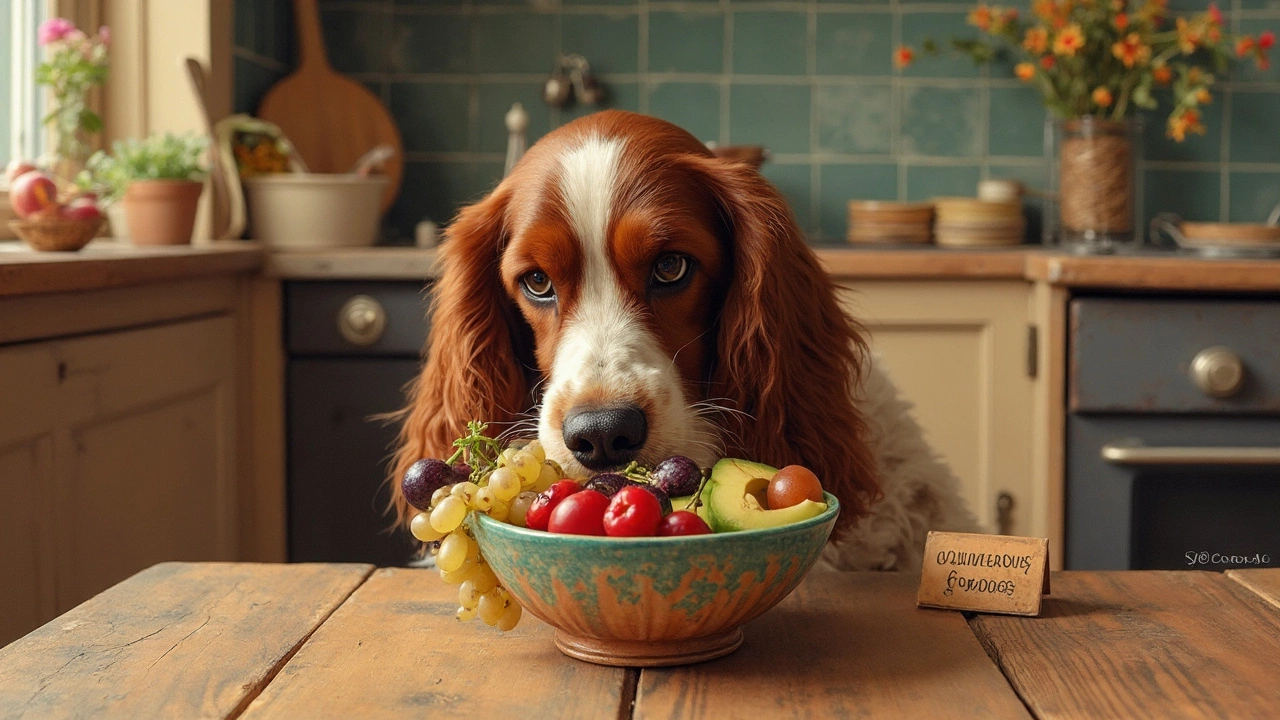Ever thought about tossing a grape to your dog during snack time? Not so fast! There are some fruits that, while healthy for humans, can be dangerously toxic to our dogs. In fact, just a few grapes or raisins can cause severe health problems. It's crucial to know which fruits are a no-go for our furry friends to keep them safe and sound.
First up, let's talk grapes and their dried buddies, raisins. It might seem harmless, but these little fruits can lead to kidney issues in dogs, sometimes with severe consequences. Then there's the juicy charm of citrus fruits like lemons and limes. While they might perk up our drinks, the citric acid doesn't sit well with dogs, potentially upsetting their stomachs.
Avocados, trendy as they are, bring about their own list of no-nos. They contain persin, a fungicidal toxin, especially found in the skin and pit, which can mess with your pup’s health. Bet you didn't see that coming! But don't worry, if you're searching for safe alternatives, there are plenty of fruits that dogs can enjoy without a hitch. Let's dig deeper into this fruity labyrinth, ensuring your pooch only gets the good stuff.
- Dangerous Fruits for Dogs
- The Risks of Grapes and Raisins
- Understanding Citrus Woes
- Why Avocados Are Off-Limits
- Other Fruits to Avoid
- Safe Alternatives for Treats
Dangerous Fruits for Dogs
When it comes to the health of man's best friend, being aware of the potential dangers lurking in your kitchen is essential. Some fruits, though delicious and nutritious for humans, can pose serious risks to dogs. Let's uncover which ones are best kept out of your dog's reach.
Grapes and Raisins
Top of the list should be grapes and their dried counterparts, raisins. Even small amounts can lead to severe health issues like kidney failure in dogs. Why? It's still a bit of a mystery, but the reactions are definitely serious enough to avoid these fruits entirely.
Citrus Fruits
While citrus fruits like oranges, lemons, and limes might seem harmless, they contain citric acid and essential oils that can upset your dog's stomach. You might notice signs like vomiting or diarrhea if they happen to sneak a taste. So it's best to keep them away.
Avocados
The trendy avocado is another fruit to steer clear of. They contain persin, which is harmless to humans but can cause health issues for dogs. The pit and skin are particularly risky, so make sure your dog doesn't get curious around this fruit.
Cherries and Stone Fruits
Cherries, along with peaches, plums, and apricots, contain cyanide in their pits and stems. This can be toxic to dogs if ingested. While the flesh of these fruits might seem tempting, the risk of pit ingestion makes them not worth the trouble.
Table of Toxicity
| Fruit | Part to Avoid | Potential Harm |
|---|---|---|
| Grapes/Raisins | All | Kidney Failure |
| Citrus | Peels, Seeds | GI Upset |
| Avocados | Skin, Pit | Respiratory Issues |
| Cherries | Stems, Pits | Cyanide Poisoning |
Knowing what fruits to avoid can save you a trip to the vet and keep your dog in good health. When in doubt, it's always a good idea to consult your vet or look up credible sources related to dog food safety. By doing so, you ensure your pet enjoys treats that are as safe as they are tasty.
The Risks of Grapes and Raisins
It might come as a surprise, but grapes and raisins are high up on the list of fruits that dogs should absolutely avoid. While many of us love them for a quick snack, they can wreak havoc on a canine's health.
Why Are They Dangerous?
For some reason, grapes and raisins are incredibly toxic to dogs, though not all dogs react the same way. Researchers are still trying to figure out exactly why these fruits are so harmful, but what we do know is they can lead to kidney failure, and in some cases, they can even be fatal.
Signs of Trouble
If your dog accidentally munches on a grape or raisin, watch out for symptoms like vomiting, lethargy, and decreased appetite. These signs can kick in within hours of ingestion. If you're seeing this, it's time to get in touch with your vet ASAP.
How Much Is Too Much?
Even a small amount of grapes or raisins can be toxic to dogs. There isn’t an exact "safe" amount, which means playing it safe and keeping these fruits out of reach is the way to go. It's better to be safe than sorry!
At a Glance: Known Risks
| Amount | Potential Risk |
|---|---|
| Few grapes/raisins | Vomiting, mild lethargy |
| Moderate amount | Severe illness, potential kidney failure |
| Large amount | Life-threatening kidney failure |
Being clued-up on these small but mighty hazards can make a huge difference in your pet's life. Keep the grapes and raisins far from your furry friend’s paws and opt for safer treat options.
Understanding Citrus Woes
So, what's the big deal with citrus fruits and dogs? Citrus fruits like oranges, lemons, and limes are packed with citric acid, and while they might give us a zesty kick, they can wreak havoc on a dog's stomach. For our beloved pets, these fruits can cause irritation or even more severe problems depending on their size and how much they've eaten.
Why Are Citrus Fruits Problematic?
The main culprit in citrus fruits is the citric acid and certain essential oils that can trigger an upset stomach in dogs. Imagine your dog's discomfort after munching on a wedge of lemon! It's not just a quirky taste they may dislike; it can be genuinely harmful. Plus, in larger amounts, the toxins in citrus fruits can lead to more serious issues like central nervous system depression.
Aside from their sourness, the peel of citrus fruits can be a concern too. Dogs often can't digest this part very well, leading to digestive blockages. The oils in the peel might also cause skin irritation for some eager pups drawn to the fresh smell.
Moderation is Key
If your dog is curious and you want to let them try a bit of orange, moderation is crucial. In small, controlled amounts, some dogs might tolerate a small piece or two without too much fuss. But remember, it shouldn't become a regular part of their diet.
Alternative Sweet Treats
Looking for safer fruity options? Stick to dog-safe fruits like apples or blueberries, which are lower in acidity and won't upset your pet's tummy.
| Fruit | Patron's Reaction |
|---|---|
| Citrus (High Citric Acid) | Potential Stomach Upset |
| Apples (Without Seeds) | Safe in Moderation |
| Blueberries | Dog-Friendly Snack |
It's all about making informed choices to keep your dog happy and healthy. Remember, when it comes to fruit, knowing what's safe and what isn't is half the battle!

Why Avocados Are Off-Limits
Avocados are trendy in human diets, but they’re definitely not a good fit for dogs. The main culprit here is persin, a fungicidal toxin found in avocados. While persin doesn’t usually bother humans, it can cause stomach upset in dogs, which is something nobody wants.
You know that creamy goodness we love in our guac? It's mostly found in the flesh of the fruit, but did you know the most concentrated areas of persin are actually in the skin and the pit? Because of this, it’s best to keep avocados where your dog can’t reach them, especially if they're inclined to sniff around the compost heap.
Potential Risks
So, what could happen if a dog gets into some avocado? Some common issues include digestive upset, vomiting, or diarrhea. In rare cases, especially if a lot’s consumed or the pit causes an obstruction, it could lead to more serious complications.
- Digestive Issues: Most common with consumption, this includes upset stomach and vomiting.
- Obstruction Risk: The sizable pit can be a choking hazard or lead to serious internal blockages.
Whether it's because of the mild toxics or the risk of choking, keeping avocados away is a smart move for pet health.
While it might feel like you're denying them a taste of the good life, there are plenty of safe alternatives for treats out there that won’t pose any risks. Being mindful about what we share with our pets makes all the difference in their health and happiness.
Other Fruits to Avoid
It turns out there are quite a few fruits that might seem wholesome but can actually pose risks to our dogs. Knowing these toxic fruits can save you and your furry friend from a lot of trouble down the road.
Cherries and Their Pits
Cherries might look tempting, especially when they're in season, but the seeds or pits contain cyanide, which can be harmful when eaten in large amounts. The pits can also be a choking hazard. Best to keep these tart treats out of your dog's reach.
Peaches and Plums: Not Always a Delight
Like cherries, peaches and plums contain pits with cyanide. While the flesh may seem okay in small quantities, it's safer to avoid them altogether. Plus, those pits can cause intestinal blockages, which no dog wants to deal with.
Persimmons: A Surprisingly Sneaky Fruit
Persimmons might not be on everyone’s list of must-have fruits, but if you're into them, keep them away from your dog. The seeds and skin can lead to intestinal irritation or even blockages, causing discomfort for your pooch.
Banana Peels: More Than Just a Slip Hazard
We often hear about banana peels being slippery, but did you know they're not great for dogs either? They're tough to digest and can lead to blockages. Some people say the fruit is fine, but remember to skip the peel.
Dr. Alice Oceans, a vet in California, says, "Dogs have different digestive systems from humans which means not all fruits are safe. When in doubt, stick to what's known to be safe and consult your vet."
Keep in mind, while it’s tempting to share everything you enjoy with your pet, some fruits really aren’t worth the risk. Stick to fruits that are confirmed to be safe, and you'll be ensuring your dog stays in top-notch health.
Safe Alternatives for Treats
So, what can you safely toss your dog as a treat without worrying about a trip to the vet? You'll be happy to know that there are several safe fruit options dogs can enjoy. These tasty alternatives are not only safe but offer nutritional benefits too.
Berries for Boost
Let's start with berries. Blueberries, strawberries, and raspberries are excellent choices. They're packed with antioxidants and low in sugar, making them perfect for your pup's diet. Plus, their size makes them easy to use as training rewards.
Crunchy Apples
Apples are another dog-friendly fruit – just be sure to remove the seeds and core. They provide vitamin A and C, plus fiber, which is good for digestion. Slices or chunks make excellent snacks, and their crunch can even help clean your dog's teeth!
Watermelon Wonders
Watermelon is a summer favorite for dogs, as it's hydrating and refreshing. This fruit is low in calories and packed with vitamins like A, B6, and C. Just remove the seeds and rind to serve it safely. Equal parts delicious and nutritious, it's a win-win!
Banana Bonanza
Bananas offer a potassium boost and natural sweetness dogs love. Easy to mash and mix into meals or freeze for a cool treat, bananas provide an energy kick without any guilt.
Melon Magic
Cantaloupe is another fiber-rich option packed with vitamins A and C. Its sweet taste is typically well-received, and it's safe when given in moderation. Remember, a little goes a long way!
When choosing fruits for your furry friend, always go for fresh options and offer them in moderation. Stick to these dog food safe treats, and you'll keep their tails wagging!





